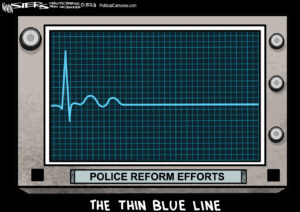FBI Abuses Patriot Act Powers
An internal Justice Department investigation has documented multiple abuses by the FBI in obtaining the private records of U.S. residents. Even with the broad powers of the Patriot Act in place, the bureau is still required to certify that the phone, e-mail and financial documents it seeks are at least related to investigations of terrorism or intelligence activities.An internal Justice Department investigation has documented multiple abuses by the FBI in obtaining the private records of U.S. residents. Even with the broad powers of the Patriot Act in place, the bureau is still required to certify that the phone, e-mail and financial documents it seeks are at least related to investigations of terrorism or intelligence activities.
In a sample of 293 “national security letters,” 22 violated regulations.
The FBI issued 19,000 such letters and made 47,000 requests in 2005. If the same error rate held true, it would mean roughly 1,426 of the letters written in that year contained violations.
Your support matters…Washington Post:
The letters enable an FBI field office to compel the release of private information without the authority of a grand jury or judge. The USA Patriot Act, enacted after the 2001 attacks, eliminated the requirement that the FBI show “specific and articulable” reasons to believe that the records it demands belong to a foreign intelligence agent or terrorist.
That law, and Bush administration guidelines for its use, transformed national security letters by permitting clandestine scrutiny of U.S. residents and visitors who are not alleged to be terrorists or spies.
Now the bureau needs only to certify that the records are “sought for” or “relevant to” an investigation “to protect against international terrorism or clandestine intelligence activities.”
According to three officials with access to the report, [Justice Department Inspector General Glenn] Fine said the possible violations he discovered did not “manifest deliberate attempts to circumvent statutory limitations or departmental policies.”
But Fine found that FBI agents used national security letters without citing an authorized investigation, claimed “exigent” circumstances that did not exist in demanding information , and did not have adequate documentation to justify the issuance of letters.
Independent journalism is under threat and overshadowed by heavily funded mainstream media.
You can help level the playing field. Become a member.
Your tax-deductible contribution keeps us digging beneath the headlines to give you thought-provoking, investigative reporting and analysis that unearths what's really happening- without compromise.
Give today to support our courageous, independent journalists.






You need to be a supporter to comment.
There are currently no responses to this article.
Be the first to respond.